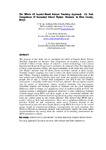The Effects Of Inquiry-Based Science Teaching Approach On Task Competence Of Secondary School Physics Students In Kitui County, Kenya

View/
Date
2021-06Author
Gathage, Kunga
Embeywa
Koech, Peter Kibet
Metadata
Show full item recordAbstract
The purpose of this study was to investigate the effect of Inquiry-Based Science Teaching Approach on learners’ task competence of secondary school physics students in Kitui County, Kenya. It adapted a mixed methodology and a Quasi Experimental Research Design and in particular the Solomon’s Four Non-Equivalent Control Group Research Design. The target population of the study was 1600 form four Physics students from 40 Extra-County secondary schools in Kitui County. Stratified random sampling was used to select four Extra-County schools (2 Girls and 2 Boys). Purposive sampling was used to select 40 students from each of the four schools and a Physics teacher from each of the two sampled schools; giving a sample size of 160. A Physics Task Competence Test (PTCT) was the research instruments. A reliability coefficient of 0.847 was obtained. The descriptive analysis was by means of frequencies, means, standard deviation and percentages. Inferential analysis was through Analysis of Variance and the Least Significant Difference (LSD) technique at a significance level of coefficient alpha α=0.05. The findings showed a statistically significant difference in task competence between students taught using IBSTA and those taught by the conventional methods. The study established that Students from the experimental groups outperformed the ones from the control group in the results obtained. This showed that IBSTA had a positive effect on their task competence. There was a significant difference in the post-test (PCBT) on task competence mean scores between students in the experimental groups who were taught Physics using IBSTA than those in the control groups taught by conventional methods. Consequently, the study concludes that IBSTA is effective in enhancing students’ task competence. Finally, the study makes recommendations key among them the creation of an enabling environment for IBSTA adoption in schools.
